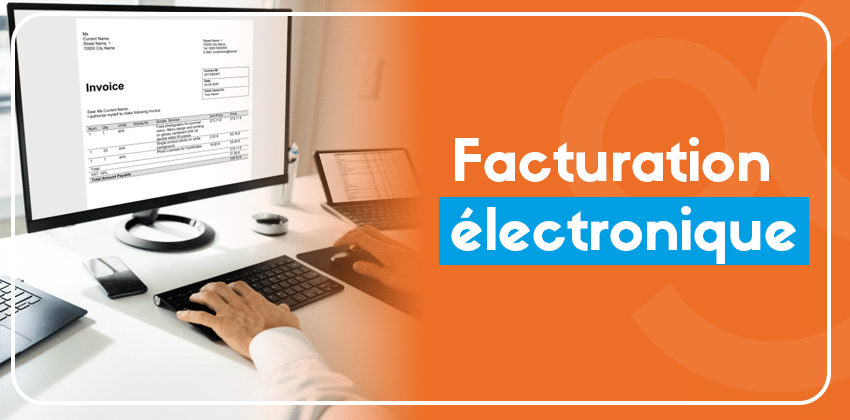The technology sector is changing fast: product innovation, digitized customer/supplier flows, ERP/CRM integrations, massive data... In this context, invoicing can no longer be left to a simple PDF sent by e-mail. The reform of electronic invoicing in France requires a profound transformation, and the deadline is approaching. As of September 1, 2026, all companies will have to be able to receive of electronic invoices and by 2027, depending on size, of’send as well. (More info on : Ministry of the Economy)
For all French companies, this represents a constraint... but also an opportunity: increased automation, improved traceability, cash flow gains are all within reach.
CONTENTS
What is electronic invoicing?
Electronic invoicing, as defined by the French government: it's no longer enough to send a PDF or scanned document; it's a structured file transmitted via an approved platform, guaranteeing authenticity of origin, integrity of content and legibility. (impots.gouv.fr)
Formats and platforms :
- Accepted formats: UBL, CII or a mixed factureX format (a structured file + an image file).
- For the exchange: you will need to go through an Approved Platform or a Compatible Solution like the one proposed by oOTARY.
Dedicated directory, published in September 2025, verifies approved platforms and billing e-mail addresses.
In short: if your company regularly exchanges data with customers, suppliers or partners, it's essential to have a system capable of sending and receiving these flows, and integrating them into your ERP.
Timetable and legal requirements in France
Main calendar :
- From September 1, 2026, all companies subject to VAT must be in ability to receive electronic invoices.
- For the show :
- Large companies + ETI: from September 1, 2026.
- SMEs/micro-businesses: obligation to issue from September 1, 2027.
Scope and e-reporting
- The reform concerns transactions between French companies (B2B) subject to VAT.
- At the same time, the e-reporting obligation: transmitting to the authorities data linked to sales to individuals or companies abroad, or to payments.
Example of penalties:
Delay or non-compliance is punishable by fines: for failure to issue an electronic invoice or e-reporting, for example, €15 per invoice and €250 per e-reporting, up to a maximum of €15,000 per calendar year.
This means that it's not just a question of choosing the right solution, but also of actively anticipate it !
Specific challenges for companies in the Tech sector
Why is the Tech’ sector particularly concerned?
Your business often depends on ERP, automated workflows and high-volume supplier/customer relationships. Electronic invoicing fits naturally into this chain. You often have partnerships, subcontractors and international flows, making compliance more critical.
The benefits:
- Automation and productivity gains Less manual input, fewer errors, more time for innovation.
- Better cash flow and shorter payment times smooth invoicing speeds up the customer-supplier cycle.
- Compliance and legal peace of mind you avoid the risk of sanctions and enhance your credibility.
- Data & control A good e-invoicing system provides structured data for analysis (cash flow, average payment time, etc.).
The risks of delay:
- Delayed integration with your ERP or platform: you'll be subject to uncontrolled processes.
- Multiplication of formats and channels (PDF + paper + electronic), making supervision more complex and increasing costs.
- Non-complianceyou're exposed to penalties and loss of competitive agility.
How do you prepare for this?
Identify current flows (customers, suppliers, partners): volume, formats, ERP used.
Check that your system is capable of sending/receiving one of the accepted formats (UBL, CII, etc.).
You can opt for an Approved Platform (AP) or a Compatible Solution (CS).
Ensure that the solution meets the requirements of the reform, that it can be interfaced with your ERP system, and that it offers security (authenticity, integrity, retention) and traceability.
Train your billing, accounting and IT teams.
Update your invoicing conditions (mandatory information, format, transmission). For example, you'll need to specify a separate delivery address and the type of transaction (goods vs. services).
Set up dashboards to monitor incoming/outgoing invoices, status, exceptions.
Make e-invoicing part of your operational efficiency strategy, not just a constraint.
Monitor KPIs: payment time, average cost per invoice, error rate.
Communicate with your customers/suppliers: inform them of the new format, timetable, what changes in the exchange.
Why choose an expert solution like oOTARY?
Your company can't afford to comply in isolation, without support.
oOTARY's compatible solution integrates directly with your ERP, so you can send/receive electronic invoices in full compliance.
- A dedicated interface to manage your customer and supplier flows, secure your exchanges, and ensure traceability and regulatory compliance.
- You transform a regulatory requirement into an efficiency lever simplifying processes, reducing risks, speeding up exchanges.


Our expertise guarantees adapted support : choice of formats, API interfacing, ERP integration, change management.
Conclusion
Electronic invoicing reform is imminent for all French companies. It's an opportunity to be at the cutting edge: not only do you comply with the law, but you also optimize your processes and gain in efficiency.
Don't let the transition overwhelm you: anticipate today, choose a robust solution, and turn this reform into a competitive advantage.
Contact an oOTARY expert to discuss your project and be ready for September 2026 ⬇️






